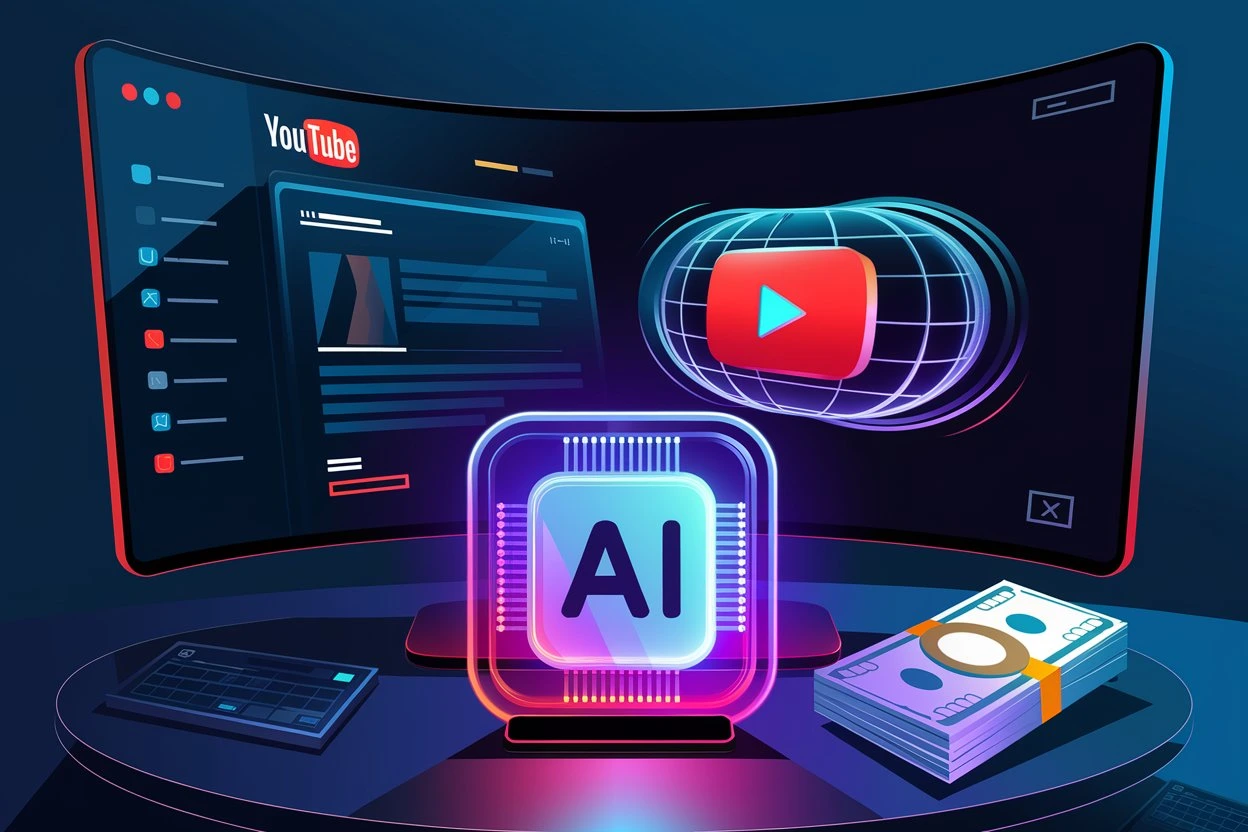YouTube has officially implemented a new content policy that bars AI-generated content from being monetized on its platform, starting July 15, 2025. The announcement, made by YouTube’s Asia Pacific team, has sparked widespread discussion among creators, AI developers, and the broader tech and media industry. This policy marks a major shift in how generative AI is treated within digital content ecosystems, with implications that stretch far beyond YouTube alone.
This article explores the rationale behind YouTube’s move, the reaction from the creator community, how it aligns with global regulatory trends, and the potential ripple effects on the future of AI content.
The Policy Shift: What It Means
AI-Generated Content Cannot Be Monetized
According to the new policy, any content that is entirely generated using artificial intelligence tools—particularly those that simulate realistic audio, video, or text—will not be eligible for YouTube’s Partner Program. This includes videos made using synthetic voices, deepfake avatars, or text-to-video technologies unless they are clearly labeled and approved under specific use cases.
YouTube emphasized that transparency and trust are key reasons for this shift. The platform aims to maintain high-quality, authentic content for its viewers and ensure that advertisers are not misled or associated with manipulated or synthetic content.
Partial Use of AI Tools Still Allowed
It is important to note that creators can still use AI tools in limited capacities. For example, background enhancement, visual editing, subtitle generation, and even script assistance using AI will not automatically disqualify monetization. However, the content must still be anchored by original, human-driven creativity.
Enforcement and Content Review
YouTube will rely on both automated detection and human moderation to flag content that may breach this policy. Violators could face demonetization, content takedowns, or even removal from the Partner Program entirely.
Creator Reactions: Mixed Emotions and Concerns
Disappointment Among AI-Focused Creators
Creators who have invested in AI-generated storytelling, animation, or synthetic news delivery are expressing disappointment over the blanket ban. Many argue that generative AI is a new form of creativity that deserves a place in the content economy. They fear the policy could stifle innovation and penalize those who are pushing the boundaries of digital media.
YouTube channels focused on AI-generated music, virtual influencers, and language learning simulations are particularly affected. These creators must now re-evaluate their strategies or pivot toward formats that meet YouTube’s human-authored content requirements.
Support From Traditional Creators
On the other hand, many traditional content creators have welcomed the move. They believe the policy protects original artists from being overshadowed by automated content. Some have pointed to increasing algorithmic favoritism toward high-volume, AI-generated videos that dilute human storytelling.
By limiting monetization, YouTube is seen as leveling the playing field and protecting the labor and time invested by human creators.
Why YouTube’s Move Matters Globally
Aligning with Regulatory Trends
YouTube’s policy is not happening in isolation. Regulatory bodies in the EU, US, and Asia have started discussing how to govern AI-generated media. The EU’s AI Act, for example, includes strict labeling and accountability requirements for synthetic content. By implementing these changes, YouTube positions itself ahead of potential legislation and reinforces its role as a responsible global platform.
In Indonesia, the Ministry of Communication and Informatics (Kominfo) has also expressed concerns over unregulated AI-generated content, particularly regarding misinformation, political manipulation, and digital fraud.
Implications for Ad Ecosystems
Advertisers are increasingly cautious about brand safety. Associating their brands with deepfakes, AI-generated fake news, or synthetic celebrities could result in reputational damage. YouTube’s monetization restrictions help reassure advertisers that their content is placed next to genuine, verifiable media.
Ad agencies and marketers have also begun updating their guidelines to exclude generative AI media from sponsored campaigns unless clearly disclosed.
The Future of AI in Content Creation
Toward Hybrid Human-AI Collaboration
While fully AI-generated content faces restrictions, the door remains open for human-AI collaboration. Tools like ChatGPT, Adobe Firefly, and RunwayML are still widely used for creative enhancement rather than full automation. The challenge now is drawing the line between assistance and authorship.
Educators, marketers, and content strategists believe the future lies in AI-augmented creativity—where human ideas are enhanced, not replaced, by machines.
Opportunity for New Platforms
YouTube’s policy may create space for new platforms to emerge that embrace and monetize AI-generated content. Startups building decentralized or niche video-sharing services may offer better monetization terms for synthetic media creators.
Open-source communities and Web3-based platforms could become the next frontier for AI-native content, offering new business models like token-based rewards or direct creator tipping.
Ethical and Social Considerations
Deepfake and Misinformation Risks
One of YouTube’s biggest motivations is the ethical concern surrounding deepfakes and misinformation. As AI tools become more powerful, the risk of manipulating public opinion or creating false identities grows. YouTube’s ban is a preventive step to reduce such risks and maintain public trust in digital content.
Transparency and Disclosure
Advocates argue that platforms should enforce mandatory AI-content disclosure instead of outright bans. Transparent labeling of AI-generated videos, like “This content was created with artificial intelligence,” could give viewers context without limiting creative freedom.
Conclusion: A Defining Moment for AI and Digital Media
YouTube’s decision to stop monetizing AI-generated content signals a defining moment in the evolution of digital media. While it raises concerns for AI innovators and creators, it also reinforces the value of authenticity, transparency, and human creativity in the content economy.
As platforms, regulators, and creators continue to navigate this complex landscape, the challenge will be to create policies that balance innovation with integrity. The debate is far from over, but YouTube has drawn a clear line—authenticity pays.
Read More






 Friday, 23-01-26
Friday, 23-01-26







